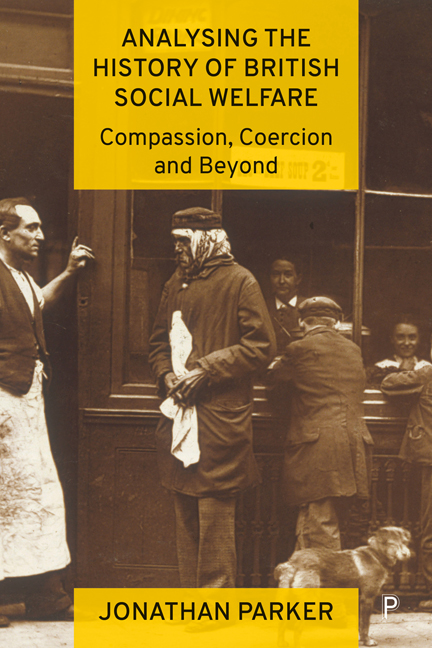Book contents
- Frontmatter
- Contents
- List of tables
- List of abbreviations
- About the author
- Acknowledgements
- 1 Concepts, continuities and critique
- 2 A brief history of British social welfare
- 3 Philosophical binaries and normative judgements
- 4 Chocolate, flowers and social welfare reform
- 5 War: the paradoxical crucible of welfare reform
- 6 Gendered perspectives on welfare
- 7 Piacular austerity: sacrificing the poor for the rich
- 8 Universal Credit versus Universal Basic Income: strange bedfellows?
- 9 Universal Credit versus Universal Basic Income: strange bedfellows?
- 10 W(h)ither welfare after Brexit and COVID-19?
- References
- Index
2 - A brief history of British social welfare
Published online by Cambridge University Press: 20 January 2024
- Frontmatter
- Contents
- List of tables
- List of abbreviations
- About the author
- Acknowledgements
- 1 Concepts, continuities and critique
- 2 A brief history of British social welfare
- 3 Philosophical binaries and normative judgements
- 4 Chocolate, flowers and social welfare reform
- 5 War: the paradoxical crucible of welfare reform
- 6 Gendered perspectives on welfare
- 7 Piacular austerity: sacrificing the poor for the rich
- 8 Universal Credit versus Universal Basic Income: strange bedfellows?
- 9 Universal Credit versus Universal Basic Income: strange bedfellows?
- 10 W(h)ither welfare after Brexit and COVID-19?
- References
- Index
Summary
Social welfare, concern for the well-being of others, permeates human history. It says much about what we are as a species and how we organise our social ecologies. It helps us learn how people construct the world, design, develop and implement its systems that assists us in responding to changing situations, and, from knowledge of the past, to address future social needs. We present, here, an overview of key shifts in human compassion and social welfare from early archaeological records, the development of organised religious charity, state-organisation and politicisation of welfare in the Poor Laws, the development of the welfare state, the demise of the assumed welfare ‘consensus’, and the growth of neoliberal and marketised approaches. The focus is thematic and chronological, identifying some of the discourses, ambivalences and continuities that permeate these histories and the functions they provide.
Care and welfare before human recorded histories
Pinker (1979/2021) posited, with a nod to ambivalence, that social welfare is embedded in our social transactions and loyalties, representing both egoism and altruism, or functional, self-interested approaches as well compassion. He challenged conventional ideas that welfare began with social policy interventions, latterly delivered through welfare states. Similarly, Finkel (2019) argued that compassion represents a core feature of human societies through the ages. As we noted in Chapter 1, social policy concerns the different ways in which human interaction is codified and embedded into the social fabric. Once this happens, various political discourses frame and shape the workings of social welfare and attach differing values and responsibilities to giving and receiving it. However, the archaeological record, our window into societies before the written word, indicates that people who were sick, disabled or in need were looked after in societies in which hunger, drought and danger were everyday challenges. For instance, Cassidy et al (2020) report identifying a young, still breastfeeding male infant from Poulnabrone in Ireland with a clear trisomy of chromosome 21, which they believe is the earliest example of a case of Down's syndrome. While the child died at around six months, he was buried in a large Neolithic burial mound that indicates privilege and which suggests, despite his disability and however this was recognised at that time, he was valued.
- Type
- Chapter
- Information
- Analysing the History of British Social WelfareCompassion, Coercion and Beyond, pp. 20 - 46Publisher: Bristol University PressPrint publication year: 2023



